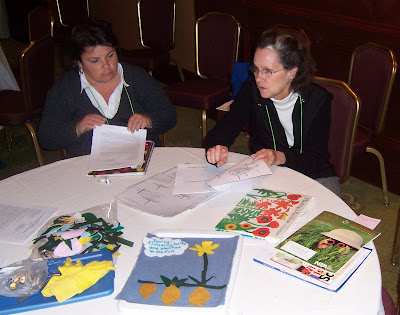VAST-ly improved learning opportunity for elementary and preK teachers—state associations aren't just for high school science teachers!
By Peggy Ashbrook
Posted on 2009-11-12
Learning about science curriculum and meeting more early childhood teachers than I expected were the happy outcomes of the two days I spent at the really well-run Virginia Association of Science Teachers 2009 Professional Development Institute.

Engaging workshops delighted early childhood teachers at VAST 2009.
Every workshop slot had a selection of presentations appropriate for the preK-2 teacher, and the organizers really know how to build a fun program. There was food, fun (dancing and a fun-dollars auction Friday night, and Mad Science presentation and door prizes on Saturday), and food for thought. I had to choose among offerings and was only able to get to some of the sessions:
- Discovery Tree program, teaching young children ecology by connecting literature and visual models—from University of Virginia’s Blandy Experimental Farm.
- Growing up WILD, learning about wildlife for young children and their teachers—from Project WILD.
- Planting a Square Foot Garden (using the book of the same name by Mel Bartholomew) to set up a school garden that is easy to maintain and can include every class, a square foot at a time.
- Butterfly resources, enthusiasm for learning was infectious and the information plentiful—their favorite site is The Butterfly website.
- Using podcasts as a learning tool—although high school teachers presented this how-to and why-to workshop, I can see how audio and visual podcasts will be a great teaching tool to use in trainings for early childhood teachers.
- Ecology Clubs—projects for young children, such as making a percussion instrument, a rainstick, using discarded cardboard tubes.
Teacher learning about leaf shapes.
In a workshop an early childhood science teacher tries out a leaf-shape sit-upon. Young children pick a leaf shape to sit on, and later look for the leaf shape in the field.
Look up your state science teacher association chapter and Associated Groups on the NSTA website and look for professional development institutes you can attend and you can present.
Peggy
Disclaimer: The views expressed in this blog post are those of the author(s) and do not necessarily reflect the official position of the National Science Teaching Association (NSTA).


